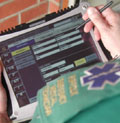 Ambulance software that enables paramedics to record patient details electronically and send them to hospital staff ahead of arrival in A&E is to be rolled out in three English NHS regions.
Ambulance software that enables paramedics to record patient details electronically and send them to hospital staff ahead of arrival in A&E is to be rolled out in three English NHS regions.
Computer Sciences Corporation (CSC) has announced an agreement with Canadian-based Medusa Medical Technologies to equip ambulances in the North, Midlands and East of England with Medusa’s Siren electronic patient-care reporting (ePCR) and data-management software.
The software will enable NHS ambulance trusts to capture electronically an expected five million patient records each year, according to CSC, which is the local service provider for the three regions. Around 1,000 paramedics out of 20,000 in the regions have already been trained on the system. East Anglia has led the way in using the system and has around 600 paramedics trained on the software.
Leigh Donoghue, CSC’s primary care director, explained how the system works. Ambulances are fitted out with docking stations and ruggedised tablet PCs. Data is entered by tapping the screen, no digital pen is needed and the system even works with gloved fingers.
At present demographic information taken from patients and their carers is entered by the paramedic but in the medium to long term the solution, which is integrated with the NHS Spine, will be able to draw down patient details from the NHS Personal Demographics Service.
Updates on the patient’s condition and information from observations can be recorded and made available to the receiving hospital.
 The paramedic takes the tablet PC into the hospital, completes the tablet record and uploads it to CSC’s data centre. A verbal handover and sign off is completed with the A&E nurse who can also access the record via a web browser the department.
The paramedic takes the tablet PC into the hospital, completes the tablet record and uploads it to CSC’s data centre. A verbal handover and sign off is completed with the A&E nurse who can also access the record via a web browser the department.
“That version of the record will also integrate with hospital systems,” explains Donoghue.
Robert Mason, programme manager for the CSC Emergency Care System, who is also a paramedic, told E-Health Insider: “The immediate benefits are the ability to track patient interventions so that they can identify the number and types of interventions that are occurring and the level of intervention.”
This gives valuable audit information for example, about the number of asthma attacks requiring paramedics’ intervention.
Dr John Scott, medical director, East of England Ambulance Trust commented: “This system allows us to capture quickly and accurately far more information than we ever could on paper. That information is then instantly available to the emergency department and clinical audit staff. As a result, the potential to improve patient outcomes is tremendous.”
Mason said the system also provided easier access to information in cases where a patient complains or a GP or hospital requests details of a case – a process that can take weeks or months when paper records have to be searched.
Mason explained: “They’ve linked the record provided from our solution in with the 999 records so they can track what happened from phone call to discharge to home or hospital.”
The system helps ambulance trusts to fulfil the broader agenda of improved ambulance care set out in the Bradley Report two years ago. It will also plan a key part in joining up communication in urgent and unplanned care.
The system will be on show at AMBEX, the Ambulance Service Association annual meeting in Harrogate from 27-29 June.
Links
